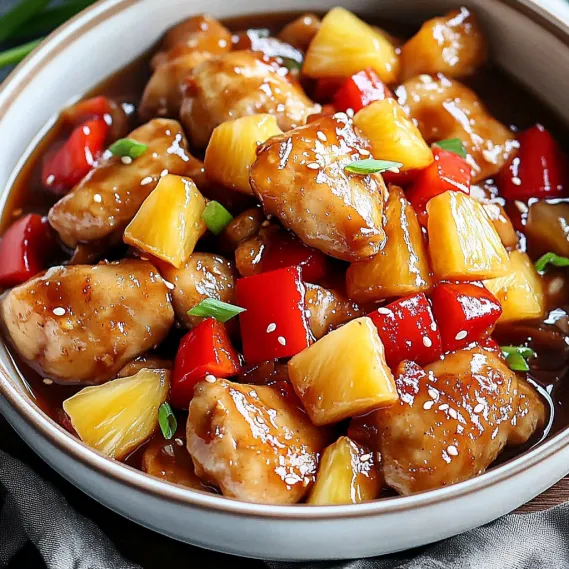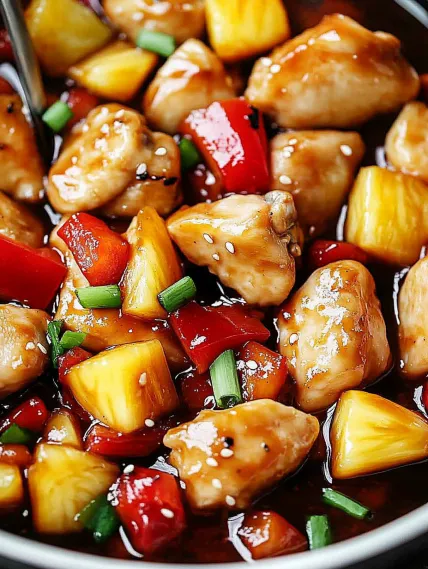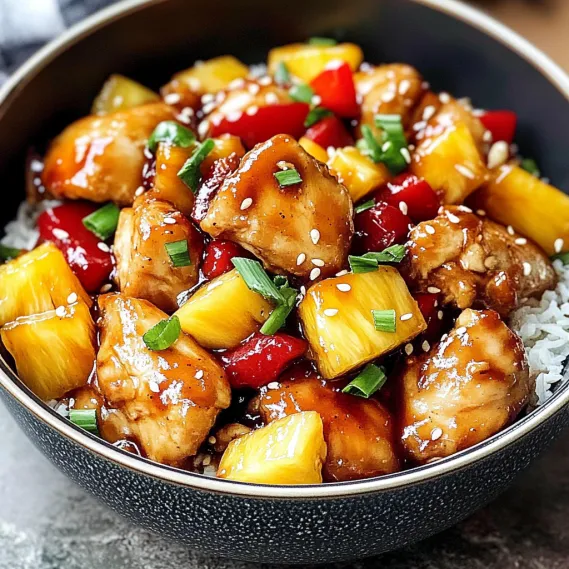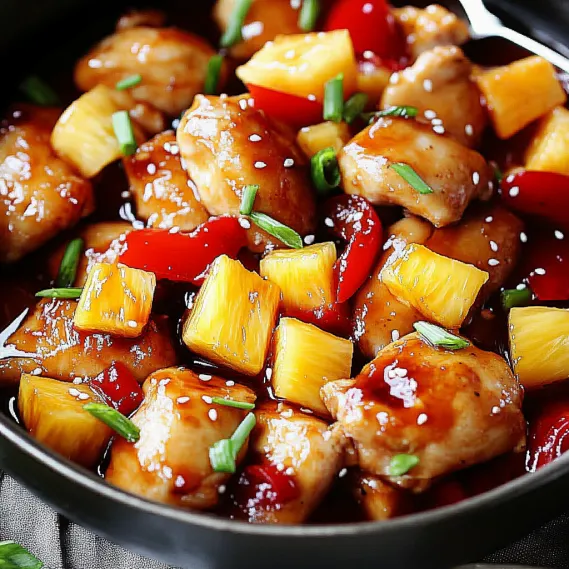 Pin it
Pin it
Tender chunks of chicken swimming in a glossy, sweet-savory sauce alongside juicy pineapple and crisp bell peppers - this Pineapple Chicken satisfies takeout cravings while being even more delicious than restaurant versions. I perfected this recipe after realizing how much money we spent ordering Chinese food, and now it's our go-to for busy weeknights. The magic happens in just 20 minutes with one pan, transforming simple ingredients into something spectacular. That perfect balance of sticky, sweet, tangy and savory flavors comes from the irresistible sauce that caramelizes beautifully around each piece.
The first time I served this to my family, my husband actually declared it better than our regular takeout spot. He specifically mentioned that the sauce had more depth and the chicken stayed juicier. Now whenever cravings strike, we don't wait for delivery - we head to the kitchen instead. My teenage son, who's notoriously picky about 'homemade versions' of his restaurant favorites, now requests this regularly.
Essential Ingredients and Selection Tips
- Chicken Thighs: Boneless, skinless thighs provide ideal moisture and richness; they're much more forgiving than breast meat if slightly overcooked.
- Red Bell Peppers: Add vibrant color, nutritional value, and natural sweetness that complements the pineapple perfectly.
- Fresh Ginger: Creates an essential aromatic foundation; pre-minced versions offer the cleanest taste.
- Pineapple Chunks: Provides tropical sweetness and gentle acidity; fresh offers superior texture, but good-quality canned in juice works well too.
- Hoisin Sauce: Delivers the rich umami backbone to the sauce; look for authentic brands with fewer additives.
- Honey: Creates that signature stickiness that defines great Chinese-American takeout dishes.
I've discovered that grinding whole spices just before making the brine produces dramatically more aromatic results than using pre-ground spices. This small extra step makes a noticeable difference in the final flavor of your corned beef.
Detailed Cooking Instructions
- Step 1: Prepare the Chicken Foundation
- Season diced chicken thighs with salt and pepper, then heat sesame and olive oil in a large skillet over medium-high heat. Add chicken pieces with space between them and allow to brown deeply on all sides until a golden crust forms, about 4-5 minutes.
- Step 2: Create the Aromatic Base
- Add minced garlic and freshly grated ginger to the partially cooked chicken and stir continuously for thirty seconds until fragrant but not browned. Introduce diced red bell pepper and continue cooking for 2 minutes until peppers begin to soften while maintaining their crispness.
- Step 3: Build the Signature Sauce
- Add pineapple chunks and reserved juice to the skillet, then incorporate hoisin sauce, low-sodium soy sauce, honey, and chicken broth. Bring everything to a gentle simmer and allow flavors to meld together for 2-3 minutes while sauce begins reducing slightly.
- Step 4: Perfect the Consistency
- Create a slurry by whisking cornstarch with cold water until completely smooth, then pour into the simmering sauce while stirring constantly. Continue cooking for 1-2 minutes until the sauce thickens noticeably and develops a glossy appearance that coats the back of a spoon.
- Step 5: Add Finishing Touches
- Ensure chicken is completely cooked through with no pink remaining (internal temperature of 165°F) and adjust seasoning to taste if needed. Remove from heat and scatter sliced green onions and toasted sesame seeds over top before serving immediately.
 Pin it
Pin it
I learned about the importance of properly drying the chicken after my first attempt resulted in a slightly dry texture. Those extra minutes make all the difference in the final creaminess of the dish.
 Pin it
Pin it
The Secret of Sauce Balance
What truly sets restaurant-quality Chinese dishes apart is sauce balance. After much experimenting, I found the perfect ratio of sweet (pineapple and honey), salty (soy sauce), umami (hoisin), and tangy (pineapple juice) elements. Too much sweetness makes the dish cloying, while too much soy creates saltiness that overwhelms the other flavors. The hoisin provides complexity with its fermented soybean base and five-spice undertones. When these elements come together correctly, they create that distinctive flavor that keeps you coming back for 'just one more bite.'
Perfect for Creating Holiday Memories
This Pineapple Chicken has become the centerpiece of our Christmas morning tradition. I prepare the fillings the night before while the kids hang stockings, then assemble and bake the pastry first thing in the morning. The house fills with an irresistible aroma that draws everyone to the kitchen, still in pajamas and eager to see the golden creation emerge from the oven. Even my teenage son, who typically sleeps until noon on school breaks, appears magically when the timer goes off.
Versatile Serving Suggestions
While this spectacular pastry was designed with Christmas morning in mind, I've found it's versatile enough for many occasions throughout the winter season. Transform it into a complete breakfast experience by pairing with fresh berries that provide bright acidity to balance the richness. For dessert applications, add a small scoop of cinnamon ice cream alongside warm slices, creating a temperature contrast that enhances spice notes throughout. During holiday gatherings, arrange sliced croissant on a tiered serving platter with sprigs of rosemary and cinnamon sticks for a festive presentation. Consider serving alongside drinking chocolate with a hint of orange zest for a particularly luxurious experience that highlights the warming spices in the gingerbread filling.
Creative Seasonal Adaptations
The basic structure of this recipe lends itself beautifully to creative variations throughout winter. Introduce orange zest to both fillings for citrus brightness that complements holiday spices beautifully. For a Scandinavian-inspired version, replace traditional gingerbread spices with cardamom and a pinch of saffron in the filling. Chocolate lovers in my family enjoy it when I incorporate cocoa powder into the gingerbread filling and add mini chocolate chips to the almond mixture, creating a mocha-inspired variation. Each adaptation maintains the impressive presentation while offering new flavor experiences that keep this special recipe interesting throughout the season.
Chef's Helpful Tips
- For extra flavor, deglaze the pan with a splash of Irish stout beer when adding the broth
- Create individual hand pies for portable lunches or potluck contributions
- Add a teaspoon of Worcestershire sauce to the filling for additional umami depth
- Grade a little Irish cheddar into the filling for a subtle cheese undertone
- For an impressive presentation, use cookie cutters to create decorative shapes from pastry scraps to place on top of the pie
I've been making variations of this pie for over a decade, constantly refining the technique. The most significant improvement came when I started using the broiler to finish the salmon, creating that perfect balance of crisp exterior and tender, juicy interior.
 Pin it
Pin it
This Pineapple Chicken recipe proves that sometimes the most memorable meals come from honoring simple ingredients with straightforward techniques that allow their natural qualities to shine through.
Frequently Asked Questions
- → Can I use chicken breast instead of thighs?
- Yes, you can substitute boneless, skinless chicken breasts for the thighs. Just be careful not to overcook them as they can dry out more easily than thighs. Cut them into bite-sized pieces and reduce the simmering time to about 4-5 minutes, or until just cooked through.
- → Can I use fresh pineapple instead of canned?
- Absolutely! Fresh pineapple works beautifully in this recipe. You'll need about 2 cups of pineapple chunks. For the sauce, you can either use store-bought pineapple juice or blend some additional fresh pineapple and strain it to get the 1/2 cup of juice needed.
- → What can I substitute for hoisin sauce?
- If you don't have hoisin sauce, you can make a substitute by mixing 2 tablespoons of soy sauce with 1 tablespoon of peanut butter, 1 teaspoon of honey, 1/2 teaspoon of garlic powder, and a pinch of five-spice powder if you have it. Alternatively, oyster sauce or teriyaki sauce can work as substitutes, though the flavor profile will be slightly different.
- → What other vegetables can I add to this dish?
- This recipe is very adaptable! Try adding snow peas, broccoli florets, sliced carrots, baby corn, or water chestnuts for extra color, texture, and nutrition. Just add harder vegetables earlier in the cooking process and more delicate ones toward the end.
- → Can I make this dish spicy?
- Yes, it's easy to add some heat! Add 1-2 teaspoons of sriracha, 1/2 teaspoon of red pepper flakes, or a thinly sliced fresh chili pepper with the garlic and ginger. Adjust the amount based on your heat preference.
